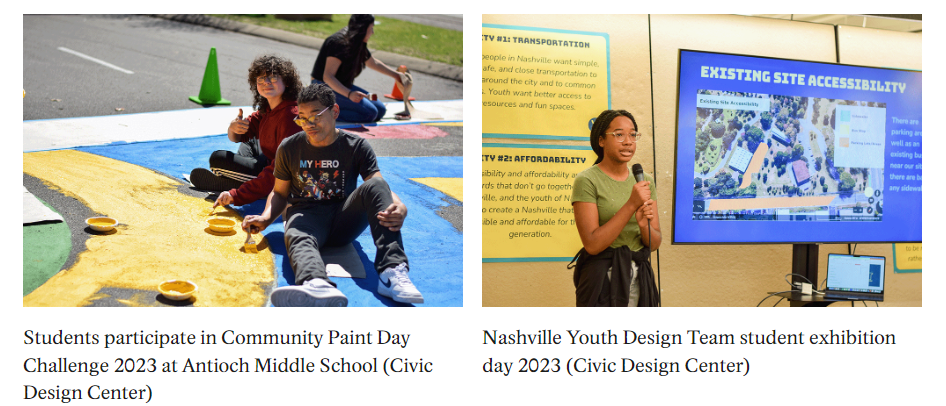Vanderbilt and Civic Design Center’s impact on Nashville’s urban evolution
For over 24 years, the Civic Design Center has stood as a beacon for community-driven urban planning projects and programs. Based in downtown Nashville, this nonprofit organization draws expertise from diverse professional and academic sources, including Vanderbilt University, to engage community members in the envisioning and shaping of the city. Since its formation in 2000, the Civic Design Center has maintained a strong bond with Vanderbilt.

Originating from grassroots opposition to a highway project in the 1990s, the Center emerged not just as an advocacy group but as a symbol of what collective vision can achieve. Former Nashville mayor and current adjunct faculty member Bill Purcell envisioned a civic design center that would form a new narrative in urban planning, with a mission to bring design-focused change that would endure for generations.
To shepherd the budding organization toward its goals, Vanderbilt University loaned James Sandlin to serve as the first executive director. Sandlin worked alongside the University of Tennessee, Knoxville’s Mark Schimmenti, who took on the role of the first design director. These early leaders exemplified the Center’s emphasis on collaborating with higher education institutions.
In 2004, the research of the advocacy group culminated in the publication of The Plan of Nashville: Avenues to a Great City, a comprehensive strategy for the urban future of Nashville, published by Vanderbilt University Press.
“Vanderbilt has been one of our strategic partners since the very beginning of the Civic Design Center’s history,” shares Gary Gaston, MED’17, Civic Design Center CEO. “The breadth at which we collaborate across university departments is a model of academic and nonprofit collaboration.”
“The impact of our combined efforts has significant positive ripple effects on the quality of life for Nashvillians of all ages. Our mentees, interns and fellows from Vanderbilt have each left their mark on the city and we know they continue to do great things as they move forward in life,” Gaston says.
A Vanderbilt alumnus, Gaston earned a master’s degree in community development and action from Peabody College of education and human development.
The long-standing partnership has continued through the contributions of Vanderbilt faculty and staff serving on the Center’s board of directors, including current board member Eric Kopstain, vice chancellor for administration.
This collaboration extends beyond administrative ties, enriching both students and the community. Vanderbilt students serving as interns and research fellows find themselves immersed in real-world projects with tangible impacts, enhancing their academic journeys and preparing them for future leadership roles in civic engagement.
“So many of our students have had opportunities to learn through involvement with the Civic Design Center while we work toward shared goals of more civic participation and more sustainable and equitable urban development,” adds Peabody College professor of human and organizational development and director of graduate studies Brian Christens.
Among the notable initiatives facilitated by this partnership are the Design Your Neighborhood and Nashville Youth Design Team programs, empowering local youth to actively shape their city’s future through education, research and advocacy. Katy Morgan, PhD‘22, and current doctoral students Kayla Anderson and Megan McCormick have been instrumental in creating and developing these initiatives.
Civic Design Center Education Director Melody Gibson partnered with Morgan, Anderson and McCormick, along with Professor Brian Christens, and the Vanderbilt Institute of Visual Research’s Natalie Robbins and Stacy Curry-Johnson on a recent study that examined the influence of the built environment on youth well-being. The Nashville Youth Design Team conducted a Youth Wellness survey among middle and high school students across Davidson County. The survey data served as the basis for a spatial analysis that provided insights into how various environmental factors influence youth well-being in Nashville.
According to Gibson, “The Civic Design Center has been able to use the research capacity from the Peabody graduate students and implement it into our daily programming, which has allowed our community engagement to be continually grounded in research and community empowerment over the years.”
The Civic Design Center’s influence also extends to the School of Engineering. Professor Lori Troxel’s engineering students have collaborated with the Center on innovative civil engineering solutions to encourage sustainable and community-focused urban development projects including urban parks, affordable housing opportunities and revitalizing underutilized city road connections.
In 2012, Joe Bandy’s sociology class, Environmental Inequality and Justice, collaborated with the Center on a study of various Nashville neighborhoods and their environmental health factors. This community-based research informed the Center’s publication, Shaping the Healthy Community: The Nashville Plan, released in 2016.
These examples are just a small window into the decades of partnership between Vanderbilt and the Civic Design Center. This collaborative alliance has been instrumental in connecting the university to the Nashville community in a period of significant growth and change in the city, championing urban design solutions that facilitate both continual learning and civic engagement.

